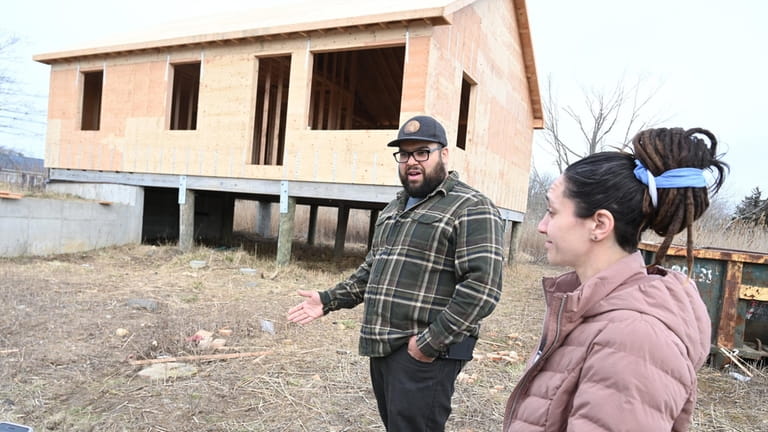New York Rising wants repayment from some who couldn't rebuild after Superstorm Sandy

Dominick Licata, one of thousands of Long Islanders who qualified for the New York Rising program, received more than a quarter-million dollars from it to repair and raise his home that was badly damaged in Superstorm Sandy.
But the 74-year-old house on William Floyd Parkway in Shirley did not survive the elevation, sustaining cracks throughout the process. It was eventually condemned.
Now, the state wants the money back.
New York State has sent Licata, 75, invoices for $271,851 to be paid in 60 monthly installments of $4,530 because the project was never completed. The state says it can charge 22% interest if he doesn't make a payment in 90 days.
What to know
- New York Rising, a program that provided funding to help homeowners rebuild after Superstorm Sandy, wants repayment from those who haven't been able to complete the work in time.
- State officials are required by the federal government to ensure the $1.2 billion is properly spent within deadlines.
- Construction delays, contractor disputes, permitting and other issues have made it difficult for some to meet deadlines. Homeowners can apply for hardship waivers.
He calls it a “ridiculous” ask after the hardship of losing his home and because as a retired educator he lives on a pension and Social Security payments.
“The government does not request refunds from successful elevation programs,” Licata said. “However, they have the audacity to go after money from the unsuccessful programs, such as my own.”
The federally funded, state-operated NY Rising was established in 2013 to help people repair their homes in the aftermath of Sandy in 2012 and Tropical Storm Irene in 2011. In Nassau and Suffolk counties, 11,500 people have spent $1.2 billion to rebuild, according to program representatives.
State officials note they are required by the federal government to ensure the funds are properly spent. The state also is required by the U.S. Department of Housing and Urban Development to spend the money by established deadlines, according to Paul Lozito, chief program officer at the state Office of Resilient Homes and Communities.
All cases must be closed before the program ends, although the state did not provide a date for that.
Homeowners who can't repay their funds can apply for hardship waivers, which are based on a range of circumstances, including age and income, state officials said.
Of the 371 applications for waivers, 325 have been granted, according to officials.
Property owners can seek waivers by calling 855-861-0154 or by emailing repaymentcoordination@nysandyhelp.ny.gov.
Licata said he was unaware of the waivers and will ask for one. He said he also plans to relocate to a state down South later this month.
“It’s just another government screw-up,” he said. “I got to get out of here."
'Lo and behold, the house cracked'
Licata bought the two-story Cape, which he said was built in 1949 with stucco and cinder blocks, in 1994. He called it a "handyman special" and said it wasn’t constructed properly — no room was level or completely square.
Still, he said it was his dream home, where he could enjoy coffee from his second-story deck and wave to joggers or mothers pushing strollers as they headed to nearby Smith Point County Park.
Sandy pushed water from Shirley’s Narrow Bay into his home, separating the living room floor from the foundation and adding to a persistent mold problem from previous storms. He’s been living in rental homes since, the latest in East Patchogue. Facing the prospect of paying rent and a mortgage, he stopped paying the mortgage and is in the foreclosure process.
He applied to the NY Rising program in 2013 and was approved for up to $298,000. Though he had insurance on the property when Sandy hit, it only covered a small portion of the damage, he said.
When contractors attempted to elevate his house in 2019, the work caused cracks throughout, separated exterior walls from the frame, damaged the roof and compromised underground electrical lines. The house was not insured at the time of the lift, Licata said.
“We went through the process and elevated the house, and lo and behold, the house cracked,” said Brian Baer, executive director of the Beacon-based nonprofit design firm The Elevated StudioBaer.
Structural damage is always a risk during home elevations, he said.
“Unreinforced concrete is not going to fare well," he said.
Construction delays, contractor issues doom deadlines
Meeting a timeline for rebuilding was always a requirement of NY Rising, and homeowners were told that if they didn’t, they could be asked to pay all or a portion of the money back. The program’s original deadline in 2017 was extended several times at the urging of local lawmakers, who noted that construction delays, contractor disputes and other reasons made that unrealistic.
Funds will no longer be awarded after June 30, according to the NY Rising website.
Licata couldn’t pass a final inspection by the March 1, 2021 deadline he was given, and he started getting letters asking him to return the money.
But it's all been spent, said Licata, who keeps his receipts and copies of canceled checks in a binder that is several inches thick. A portion went to a contractor who was paid $26,000 but never performed any work, according to a complaint Licata filed with the Suffolk County Division of Consumer Affairs. The contractor told the agency he couldn't do the work because there weren't permits in place. Licata then terminated the contract.
Other funds paid for Baer's fees as well as repairs not covered by insurance. Hundreds of dollars were spent on permits, according to Licata's files. And, of course, the unsuccessful lift.
“Anyone who had anything to do with making the house resilient got their money,” Licata said. “All the money went to the house.”
Licata is not the only resident of the tri-hamlet area in this situation.
Ray Sullivan's four-bedroom family home on Bayside Road in Mastic Beach was destroyed in Sandy. Sullivan was awarded about $150,000 from NY Rising in 2015 and had planned to build an elevated three-bedroom home on the site.
The project has been delayed several times, partly because of a contractor who took more than $40,000 and never delivered the modular home he promised. There also were complications from when Mastic Beach Village dissolved in 2017.

Ray and Alexandra Sullivan received funding to rebuild their Mastic Beach home from the NY Rising program. They haven't finished the project, and the state wants the money back. Credit: John Roca
Construction on the low-lying property continues, but Sullivan received the state's latest repayment letter Wednesday, asking him for $123,750 because he has not completed the project in time.
“I’ve run into hurdle after hurdle, brick wall after brick wall,” said Sullivan, 32, a consultant in the pharmaceutical industry. “I’ve provided all this information to New York Rising. I know I can’t be the only one in my community who ran into the same stops as I have."
“It just doesn’t make sense,” added his wife, Alexandra, 29, who works as a birth doula.
The couple, parents to four children between the ages of 16 months and 7, watched workers erect the home's wood frame this month.
“Whether I am in here with my bare hands, I have to finish this,” Ray said.
Both the Sullivans and Licata contacted their county legislator, Jim Mazzarella (R-Moriches), whose aide Tim Rothang has been acting as an intermediary with the state. Rothang said the state representatives his office spoke with haven’t “budged one bit” despite arguments that the homeowners acted in good faith.
“I think they're trying to apply the same rules across the board, and there's so many variables involved,” Mazzarella said. “They have to be a little bit more, maybe sympathetic, and a little bit more hands on.”
Lozito stressed that despite the issues, NY Rising has helped thousands of New Yorkers build stronger homes.
“We are proud of this program,” he said. “We did help to build a more resilient Long Island."

